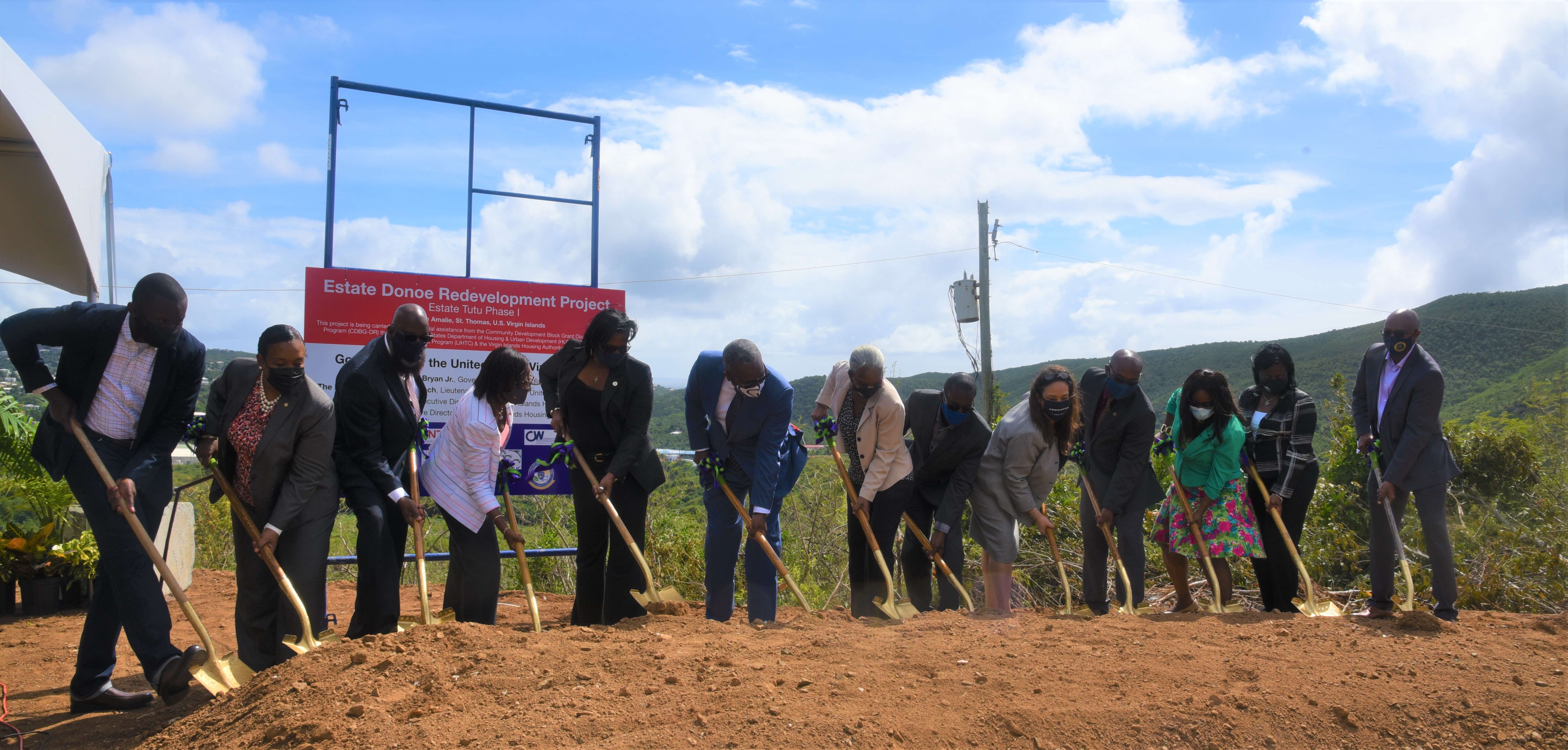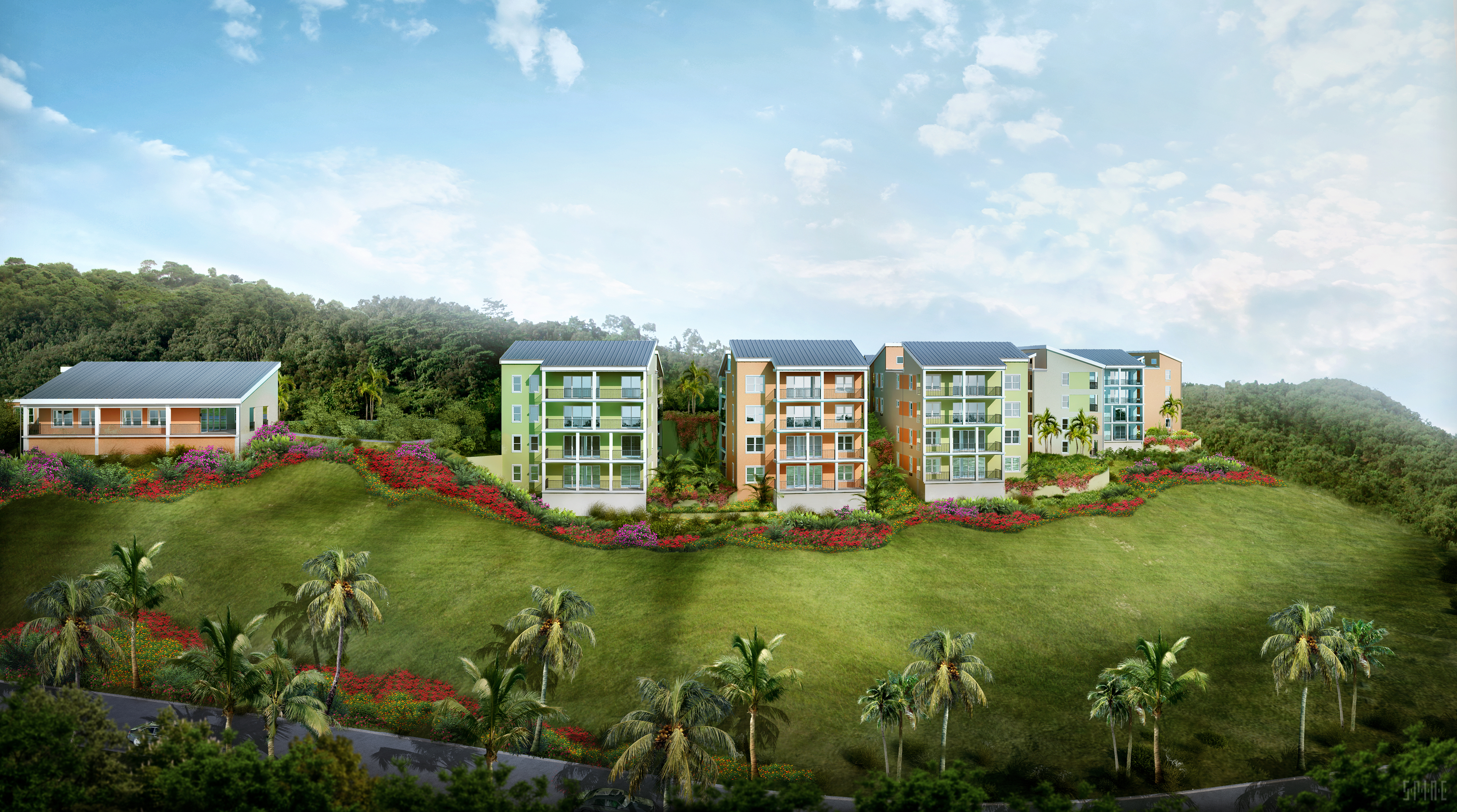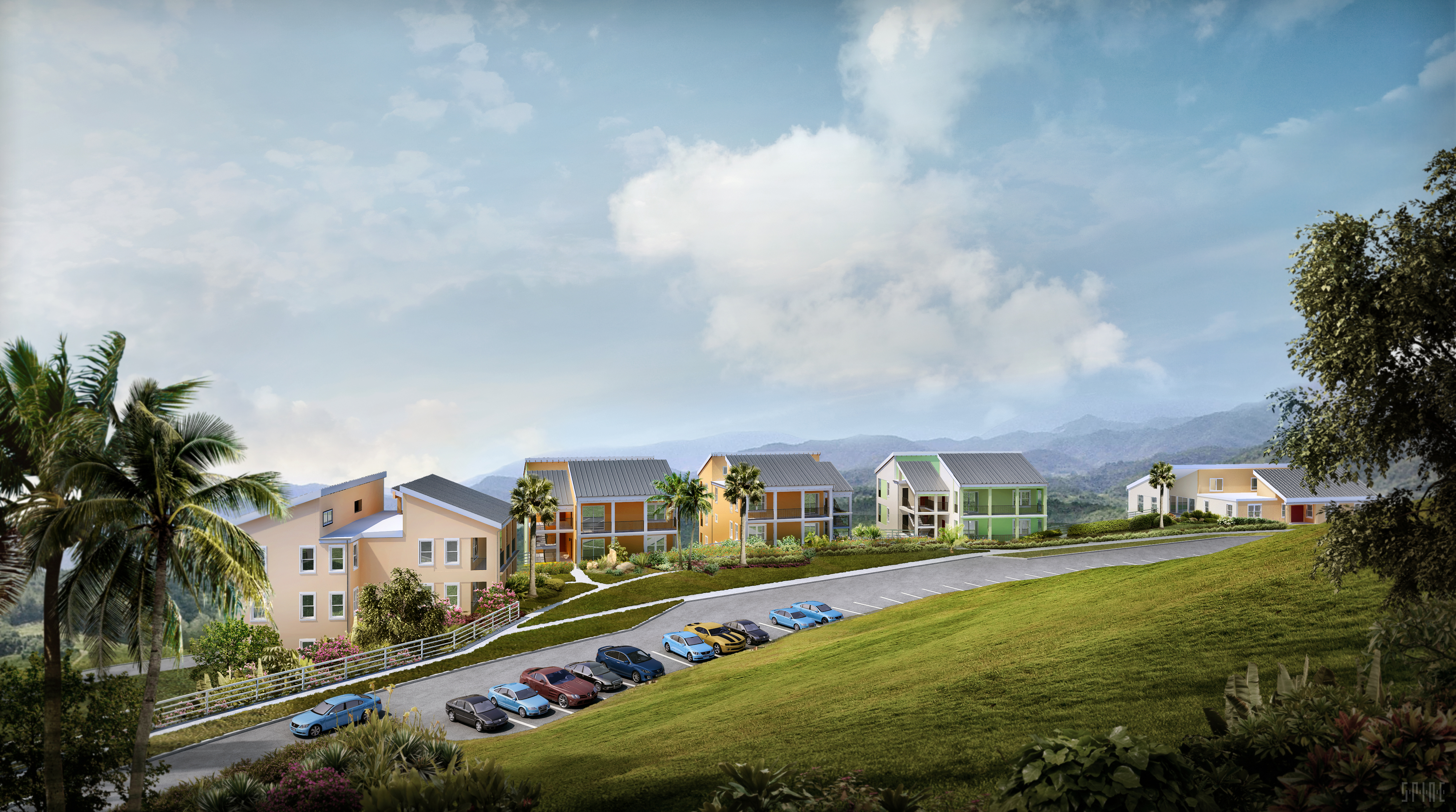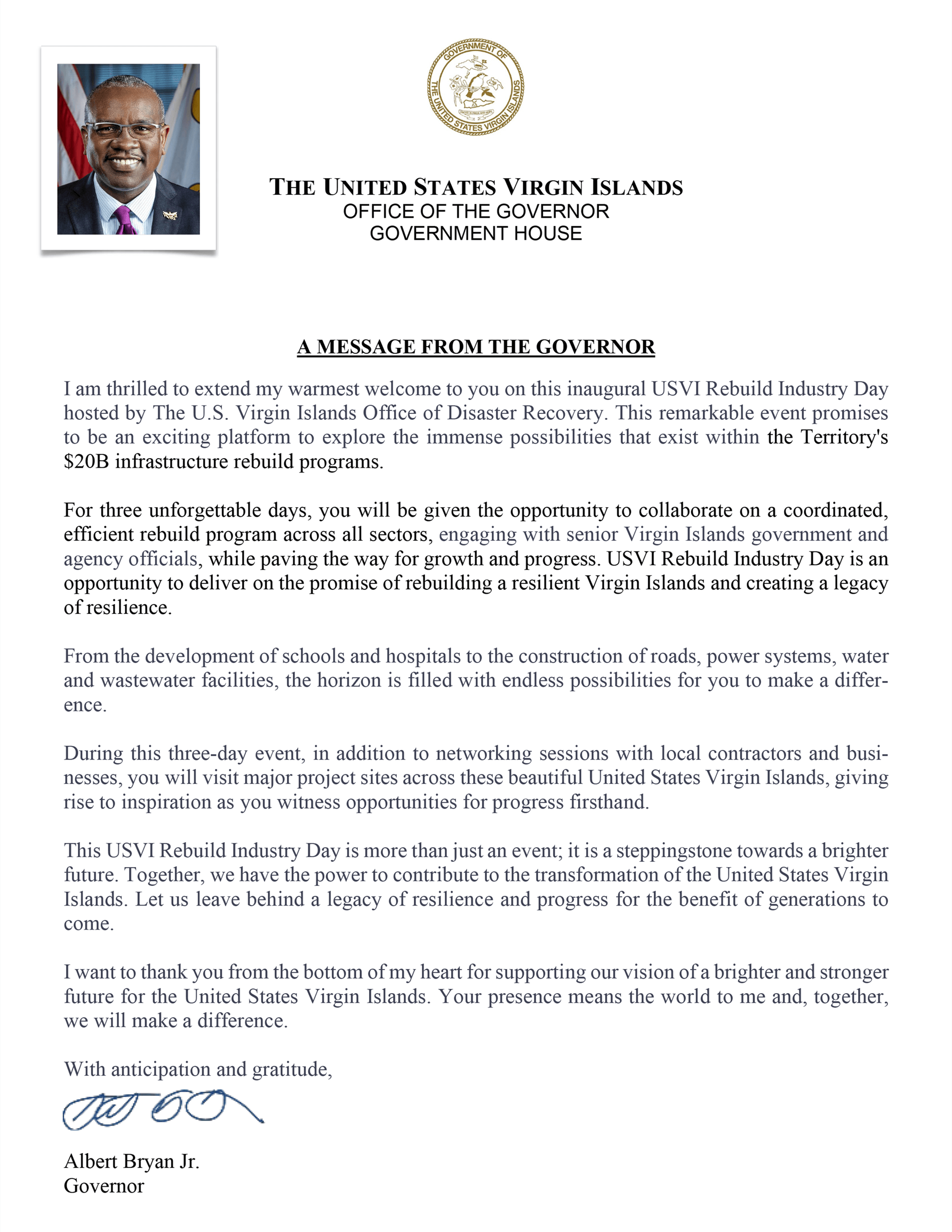
Pictured from left to right are: VIHA resident board member Simba Abiff, Senior Vice President and Division Manager-Banco Popular de Puerto Rico Oran Roebuck, V.I. Housing Finance Authority CEO Darin Richardson, Director of the Office of Disaster Recovery Adrienne L. Williams-Octalien, Senate President Donna Frett-Gregory, Governor Albert Bryan Jr., President of V.I. Housing Revitalization Corporation Noreen Micheal, Sen. Marvin Blyden, Senior Vice President of Development at Pennrose Ivy Dench-Carter, Office of Delegate to Congress Stacey Plaskett representative Cletis Clendenin, Sen. Carla Joseph, V.I. Housing Authority acting executive director Lydia Pelle, and Sen. Milton Potter
January 14, 2021
V.I. Housing Authority Breaks Ground on First Apartment Community in a
Territory-Wide Public Housing Renewal Plan
ST. THOMAS – V.I. dignitaries led by Governor Albert Bryan, Jr. and Congresswoman Stacey Plaskett hoisted shovels on Thursday in a symbolic ground-breaking of a new apartment community – the first of three phases– that will replace and completely reinvent the Tutu High Rise and Donoe public housing that was irreparably damaged by Hurricanes Marilyn, Irma and Maria.
Co-developed by the Virgin Islands Housing Authority (VIHA) and Pennrose, LLC with development consultant Jackson Development Company (JDC), Estate Donoe will offer 84 spacious apartments in 14 buildings set among 10.6 landscaped acres, ideally located near schools, job centers, the public library, pharmacies, grocery shopping, banks and public transportation.
Former residents of Tutu and Donoe will be given the first opportunity to occupy the new apartments when completed in December 2022, according to VIHA Executive Director Robert Graham.
“Thanks to our partnerships with best-in-class co-developers such as Pennrose and JDC, and to the Virgin Islands Housing Finance Authority (VIHFA) for the CDBG-DR funds, we have a historic opportunity to provide the Territory’s low-income residents with a quality of living unprecedented in the history of public housing, even when that housing was new,” Graham said.
Governor Albert Bryan, Jr., an advocate of affordable housing for mid-level as well as low-income earners, praised the construction start. “Today we start building something,” Governor Bryan said. “They (VIHA) are doing a tremendous job.”
Designed to National Green Building Standards, Estate Donoe will feature open floor plans and generously sized rooms, Energy-Star appliances and lighting, low-water usage fixtures, high-efficiency air conditioning units in the bedrooms, and no electric bill, thanks to an onsite micro-grid with a solar photovoltaic system and micro-turbine battery back-up system.
“Pennrose is committed to creating high-quality, affordable housing that not only improves the lives of residents but transforms communities and surrounding neighborhoods,” said Ivy Dench-Carter, Senior Vice President of Development at Pennrose. “We’re honored to support the critical recovery efforts led by
the Virgin Islands Housing Authority and eager to begin construction on future phases of development that will deeply impact the community at large.”
VIHA will lease the land to Pennrose, which will own the improvements. In return, the housing authority will maintain a controlling interest in the community’s operation and management to assure it can carry out its mission of providing safe, decent housing for people with very low incomes who could not otherwise afford it.
Built in the early 1970s, the original Donoe community packed some 1,000 people in 300 apartments in 85 buildings. Senate President Donna Frett-Gregory grew up in the community when it was new, she said. Senator Marvin Blyden, a housing manager in 1999 who witnessed the demolition of the complex, remembered, “The buildings had withstood many hurricanes and sustained structural damages. By the time Marilyn came in 1995, it was literally falling down.”
Ten percent of the Territory’s public housing units have been destroyed by major hurricanes with no capital to replace them, Graham noted.
With funds from CDBG-DR and U.S. Housing & Urban Development, VIHA can now renew its entire public housing portfolio – half with new developments and half with complete renovations — a $1.1 billion undertaking over the next eight to 10 years.
“We are proud to partner with the Virgin Islands Housing Authority and Pennrose on Estate Donoe,” said Hunt Capital Partners Executive Managing Director Dana Mayo. “This affordable, power self-sufficient housing development is a significant milestone for the island, for the residents, and for the local economy. We are glad to be part of this historic deal that will bring critically needed housing to families who need it most on St. Thomas.”
Budgeted for $57.7 million, the financial closing for Estate Donoe occurred on December 3, 2020. Hunt Capital Partners provided $26.95 million, nine percent of federal low-income housing tax credit equity. Estate Donoe will also be financed with a combination of a construction loan from Banco Popular and Federal Home Loan Bank-Affordable Housing Program funds, as well as Community Development Block Grant-Disaster Recovery funds, solar tax credits and deferred developer fee funds.
All 84 apartments will be subsidized with HUD Project-Based Vouchers. VIHA will enter a Housing Assistance Payment Agreement that assures their affordability for 20 years, with an option to renew the contract.
Pennrose also signed a Memorandum of Understanding with VIHA ensuring that residents have access to local agencies and social services that enhance their quality of life. For example:
- Budgeting and financial management
- Workforce readiness
- Computer skills
- Resume preparation, interviewing skills and job leads
- Child tutoring in reading, writing and math
- Fitness and nutrition
- Substance abuse and/or mental health counseling.
“Estate Donoe is the first of a new generation of communities that will arise over the next 10 years and address the total well-being of our residents,” Graham said. “It is not only a more inviting and sustainable community but also one with wrap-around services to help families and their children thrive.”



